Hãy nhập câu hỏi của bạn vào đây, nếu là tài khoản VIP, bạn sẽ được ưu tiên trả lời.

5 , Complete the sentences
|
Long Form |
Short Form |
|
1, He .....is not....Feeding the dog |
he .....isn't.........feeding the dog |
| 2 , They .......are not.......reading | They ........aren't...................reading |
| 3 , It .........is not..............flying | It .........isn't.....................flying |
| 4 , We .....are.......not cleaning the floor | we ......aren't.......cleaning the floor |
| 5 , I ..........am................not crying | I .......am not............crying |

Đại Từ Tân Ngữ
Đại từ tân ngữ cũng là đại từ nhân xưng nhưng chúng không được làm chủ ngữ mà chỉ được làm tân ngữ hay bổ ngữ.
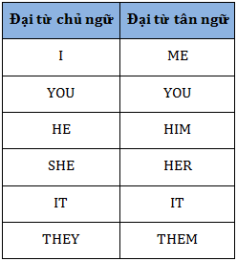
Đại Từ Nhân Xưng
Đại từ nhân xưng là những từ dùng để xưng hô trong giao tiếp. Ngôi thứ nhất thuộc về người nói, ngôi thứ hai thuộc về người nghe, ngôi thứ ba thuộc về người hoặc con vật hoặc đồ vật mà người nói và người nghe đề cập tới. Đại từ nhân xưng được làm chủ ngữ nên có thể gọi chúng là đại từ chủ ngữ.
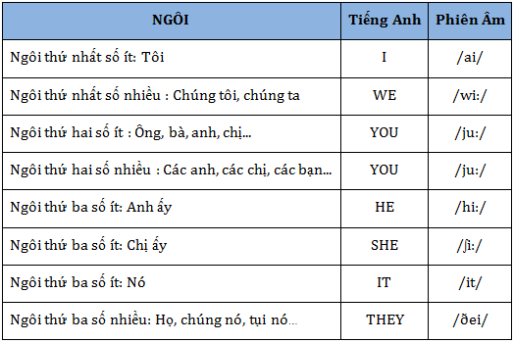 * Lưu ý:
* Lưu ý:
- Khi muốn kêu người nào đó từ xa, ĐỪNG BAO GIỜ kêu “YOU, YOU” vì như vậy là rất bất lịch sự. Nếu người đó là nam, có thể kêu MR, nữ, có thể kêuMRS, hoặc MISS.
- “IT” chỉ dùng cho con vật, đồ vật, sự vật hoặc danh từ trừu tượng, không bao giờ dùng để chỉ người. Trong tiếng Việt, ta có thể dùng “NÓ” để chỉ người thứ ba nào đó. Trong trường hợp này, trong tiếng Anh, chỉ có thể dịch “NÓ” thành “HE” hoặc “SHE” tùy theo giới tính.
Đại Từ Sở Hữu
Người ta dùng đại từ sở hữu để tránh khỏi phải nhắc lại tính từ sở hữu + danh từ đã đề cập trước đó. Nó có nghĩa: mine = cái của tôi; yours = cái của (các) bạn; … Do đó chúng thay thế cho danh từ. Đừng bao giờ dùng cả đại từ sở hữu lẫn danh từ. Mặc dù cách viết của his và its đối với tính từ sở hữu và đại từ sở hữu là giống nhau nhưng bạn cần phân biệt rõ hai trừờng hợp này.
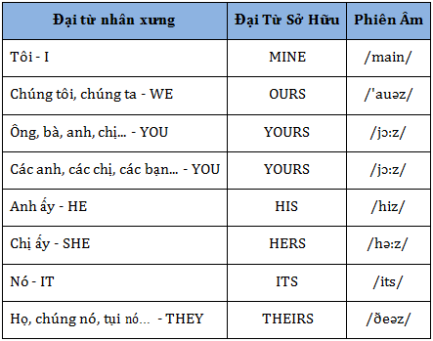
Tính Từ Sở Hữu
Tính từ sở hữu khác với đại từ sở hữu (nêu trên) ở chỗ nó bổ nghĩa cho danh từ chứ không thay thế cho danh từ. Gọi là tính từ sở hữu vì nó thể hiện tính chất sở hữu của người hoặc vật đối với danh từ đi sau nó. Chú ý rằng cũng dùng tính từ sở hữu đối với các bộ phận trên cở thể.
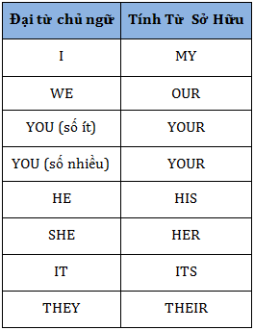
Đại Từ Tân Ngữ
Đại từ tân ngữ cũng là đại từ nhân xưng nhưng chúng không được làm chủ ngữ mà chỉ được làm tân ngữ hay bổ ngữ.

Đại Từ Phản Thân
Đại từ phản thân là đại từ đặc biệt phải dùng khi chủ ngữ và bổ ngữ là một.
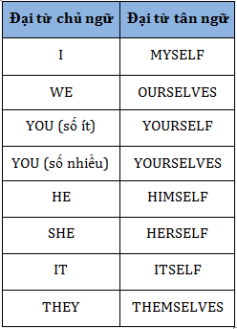
TỔNG HỢP
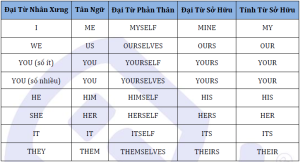

1. "Could you please give me my dictionary ?" - "...................... "
| A. Yes, I could | B. Sure. Here you are |
| C. No, I couldn't | D. Yes, please |
2. "Are you doing anything tonight ?" - " ............................. "
| A. Yes, I'm doing anything tonight. |
| B. No, I'm completely free tonight. |
| C. I am doing tonight. |
| D. I am not doing tonight. |
3. "What does your father do ?" - ".................."
| A. He is working in a factory. |
| B. He is sleeping. |
| C. He is fine. |
| D. He is good. |
4. "How far is it from your house to your school ?" - "....................."
| A. It takes a long time. |
| B. It is fine. |
| C. It is about 2 km. |
| D. I walk to school. |
5. "How much are your new shoes ?" - "........................"
| A. They are 150,000 VND. |
| B. They are made in Vietnam. |
| C. They are good. |
| D. I like them. |

A. Match the questions in column A with the answers in column B. THERE IS ONE EXTRA ANSWER THAT YOU DON’T NEED. (1m)
|
A |
B |
|
1. Where is your classroom? |
a. I'm in class 6A. |
|
2. What do they do after school? |
b. Yes, I do. |
|
3. Does she watch television? |
c. It's on the second floor. |
|
4. Which class are you in? |
d. Yes, she does. |
|
|
e. They play soccer. |
1. ______c__; 2. _____e___; 3. ___d_____; 4. ___a_____.
A. Match the questions in column A with the answers in column B. THERE IS ONE EXTRA ANSWER THAT YOU DON’T NEED. (1m)
|
A |
B |
|
1. Where is your classroom? |
a. I'm in class 6A. |
|
2. What do they do after school? |
b. Yes, I do. |
|
3. Does she watch television? |
c. It's on the second floor. |
|
4. Which class are you in? |
d. Yes, she does. |
|
|
e. They play soccer. |
1. __c______; 2. ___e_____; 3. ___d_____; 4. ___a_____.

Nối:
| No | A | No | B |
| 1 | What's your village like? | A | It's beautiful. It hasn't got a lot of cars. |
| 2 | What happened at the end of the story? | B | The prince got married with the princess. |
| 3 | What shouldn't he do? | D | He shouldn' play with a lighter. |
| 4 | What did you do on your holiday? | E | I went to Malaysia. |
| 5 | What character in the story do you like? | C | I like the fox because it is clever. |

| Subject pronoun | Object pronoun |
|
I |
(1) me |
| he | (2)him |
| she | (3)her |
| it | (4)it |
| we | (5)us |
| you |
(6)you |
| they | (7)them |
Tựa đề 1 : COMPLETE THE GRAMMAR TABLE WITH THE OBJECT PRONOUNS
II. Choose the correct pronouns tp complete the next.
My sister and her family live in Turkey. (1) (We)/ US don;t see (2) they / them very often, but (3) they / them Skype (4) we / us . (5) She / Her husband's name is Mehmet. (6) He / Him is from Istanbul. (7) HE/ Him is very nice. We all like (8) he/ him.
III. Write the plural form of these words.
1. sandwich
sandwiches
2.bag
bags
3. fish
fish
4. wowan
women
5. box
boxes
6. tomato
tomatoes
7. day
days
8.city
cities
| Subject pronoun | Object pronoun |
|
I |
(1) me |
| he | (2) him |
| she | (3) her |
| it | (4) it |
| we | (5) us |
| you |
(6) you |
| they | (7) them |
Tựa đề 1 : COMPLETE THE GRAMMAR TABLE WITH THE OBJECT PRONOUNS
II. Choose the correct pronouns tp complete the next.
My sister and her family live in Turkey. (1) (We)/ US don't see (2) they / (them) very often, but (3) (they) / them Skype (4) we / (us) . (5) She / (Her) husband's name is Mehmet. (6) (He) / Him is from Istanbul. (7) (HE)/ Him is very nice. We all like (8) he/ (him).
III. Write the plural form of these words.
1. sandwich
sandwiches
2.bag
......bags........
3. fish
......fish........
4. wowan
.......women........
5. box
......boxes.......
6. tomato
........tomatoes..........
7. day
......days........
8.city
......cities........

Bài 1 Chia động từ trong ngoặc các câu sau :
1. My father (watch) watches television every day
2. There (be) are trees and flowers in the garden
3. She (have) has breakfast at 6 o'clock.
4. We (play) are playing soccer at the moment
Bài 2 Nối câu hỏi ở cột A với câu trả lời cột B
|
A |
B | ||
|
1. Do you live in a town? |
a. He goes to school by bike. | ||
|
2. How does he go to school? |
b. We have it on Monday and Wednesday |
||
|
3. When do we have English? |
c. He works in a factory | ||
|
4. Is there a river near your house? |
d.Yes , I do
|
||
|
5. What are they doing |
1 - D
2- A
3- B
4- E
5- C
#Yumi
Bài 1 Chia động từ trong ngoặc các câu sau :
1. My father (watch) watches television every day
2. There (be) are trees and flowers in the garden
3. She (have) has breakfast at 6 o'clock.
4. We (play) are playing soccer at the moment
Bài 2 Nối câu hỏi ở cột A với câu trả lời cột B
|
A |
B | |
|
1. Do you live in a town? |
1.D | a. He goes to school by bike. |
|
2. How does he go to school? |
2.A |
b. We have it on Monday and Wednesday |
|
3. When do we have English? |
3.B | c. He works in a factory |
|
4. Is there a river near your house? |
4.E | d.Yes , I do |
|
5. What are they doing |
5.C | e. No, there isn't |

2 Complete the sentences as in the example :
|
Long From |
Short Form |
| 1 She .....has............cleaned the house | She's cleaned the house |
| 2 We ................have...........not worked hard | We' ve..........................................worked hard |
| 3 I ..................have.........visited them several times | I've ....................................visited them several times |
| 4 She ..............has..........................not finished yet | She's .......................................finished yet |
| 5 They .......................have..............talked to him | They've..........................................talked to him |
2 Complete the sentences as in the example :
|
Long From |
Short Form |
| 1 She .....has............cleaned the house | She's cleaned the house |
| 2 We ...............have............not worked hard | We .........................haven't.................worked hard |
| 3 I ..............have.............visited them several times | I've.......................visited them several times |
| 4 She ...........hasn't.............................not finished yet | She's not .......................................finished yet |
| 5 They .................have....................talked to him | They've ..........................................talked to him |

1. Nối cột A với cột B:
| A | B | Nối |
| 1. What did they do at the school festival? | .b. They sang and danced a lot. | 1- |
| 2. Did he go to the zoo last weekend? | a. No, he didn't | 2- |
| 3. Can your sister ride to school? | .e. No, she can't. | 3- |
| 4. May I come in? | .c. Sure | 4- |
| 5. Would you like some apple uice? | d. No, thanks | 5- |
2. Correct the answer:
1. It=>It is very hot in summer.
2. What do you want play=>to play?
3. Phong usually watch=>watches games on T.V.
4. The living room is large=>larger than the kitchen.
5. How many people are there in yours=>your family?
1. Nối cột A với cột B:
| A | B | Nối |
| 1. What did they do at the school festival? | a. No, he didn't. | 1-b |
| 2. Did he go to the zoo last weekend? | b. They sang and danced a lot. | 2-a |
| 3. Can your sister ride to school? | c. Sure. | 3-e |
| 4. May I come in? | d. No, thanks. | 4-c |
| 5. Would you like some apple uice? | e. No, she can't. | 5-d |
2. Correct the answer:
1. It very hot in summer. => It is very hot in summer.
2. What do you want play? => What do you want to play ?
3. Phong usually watch games on T.V. => Phong usually watch games on T.V.
4. The living room is large than the kitchen.
=> The living room is larger than the kitchen.
5. How many people are there in yours family?
=> How many people are there in your family ?
1 we
2 haven't
hasn't
has
haven't